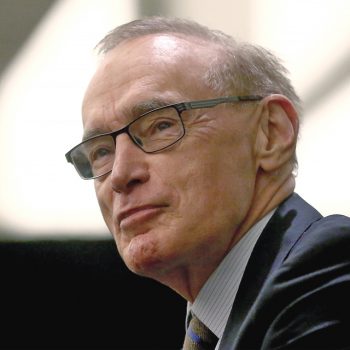
Former NSW Premier Bob Carr has called for a population manifesto to respond to Australia’s growing population pressures.
Professor Carr, now an Industry Professor in Business and Climate Change at UTS, said a population policy would have to include a range for immigration intake, a series of sustainability benchmarks and a Commonwealth commitment on infrastructure.

“It would link the intake to infrastructure, density and density infrastructure sustainability,” he told Government News after speaking about population during a panel session at the Western Sydney Leadership Dialogue on Tuesday.
“It would force the Commonwealth to think about the impact on cities of upping immigration.”
Australia’s population grew by 1.6 per cent in the year ending 30 September 2018, reaching 25.1 million, according to the latest ABS figures.
The federal budget, meanwhile, estimates growth will average around 1.7 per cent a year over the next four years with the population pushing 27 million by 2022.
Prime Minister Scott Morrison earlier this year announced the Coalition’s population plan but the nation hasn’t had a formal policy since the White Australia policy of the first half of last century.
Professor Carr earlier told the forum that a population policy would provide a range for immigration intake rather than a net number.
“Most importantly it would provide a set of benchmarks,” he said. “Those would be measures, for example, of water recycling; measures related to air pollution; measures of our capacity to rejuvenate and sustain our urban environment; and infrastructure.
“I think it would be possible to have these factors written into a document that represents a population policy and builds public confidence about Commonwealth support, and about the gains in environmental quality that will accompany what some might see as an ambitious target for net intake on an annual basis.”
Confronting the question of density
A Commonwealth population policy would also have to address the population elephant in the room: increased density, an issue which Professor Carr said had previously been handpassed to state and local governments which were often all too keen to politicise it, with less than optimal results.
“It is lazy for Canberra public servants and politicians to say, ‘I stand for a big Australia we’re going to ramp it up’ and not talk about a Commonwealth commitment to infrastructure or sustainability, or involve themselves in the argument about density,” he said.
Something as simple as good building design could remove much of the resistance to density, Professor Carr said.
“Once you establish the designs local and state governments are offering communities are the very best, a lot of the resistance for higher density vanishes.”
A new paradigm – access instead of ownership
Urban Taskforce CEO Chris Johnson said quality of life was entirely compatible with increased density, as long as the supporting infrastructure was in place.
Australia had reached a tipping point where the spreading low rise suburban model could no longer be sustained, Mr Johnson said, and a shift from ownership to access could provide a new paradigm.
“There a move from hyperconsumption – where we want the biggest house with three cars and a boat and a swimming pool – to cooperative consumption,” Mr Johnson said.
“Instead of wanting to own all those things, you can have access to them. So you have access a swimming pool in your apartment block, childcare in your own complex, gardens, a gym.”
The federal government’s population package, announced before the federal budget, proposes tackling population growth though migration levers, infrastructure, higher education and regional development.
The headline announcement was a reduction in the migration ceiling from 190,000 to 160,000 a year over the next four years. The government also pledged to provide infrastructure and ease pressure on Australia’s biggest cities.
Comment below to have your say on this story.
If you have a news story or tip-off, get in touch at editorial@governmentnews.com.au.
Sign up to the Government News newsletter.
2 thoughts on “Time to talk about population policy: Carr”
Leave a comment:
Most read
Scathing report finds little has changed at PwC
Qld council welcomes progress on massive battery system
Inquiry to consider how federal govt can address councils’ sustainability issues
‘Local’ procurement turns out not to be so local, committee hears
Another report finds local government falling down on cyber security
Professor Carr’s comments are most welcome. We do indeed need to have a civilised discussion about population growth in Australia, taking into account environmental issues as well as social and economic, because the environmental (including reaching carbon reduction targets) have largely been missing from the public debate so far.
As always, Bob’s thoughts on our population growth dilemma are accurate and constructive. The lack of a sensible cohesive population policy in this country is a direct result of the power and influence of the militant “growth lobby”. The continued pressure applied to our pollies from the econocrats in treasury and vested interests in big biz and certain unions has prevented us from having a sensible national discussion on this matter. And add in the social justice warriors in the Greens and their desire for open borders. Meanwhile, our wildlife and natural ecosystems continue to suffer and decline under the weight of the continued expansion of the human juggernaut in Australia. Peri-urban bushland (wildlife habitat) continues to be bulldozed and turned into housing estates to accommodate our burgeoning population. it’s time to ignore the growthists and listen instead to Bob Carr, Dick Smith, and the sustainable population groups and have a considered national debate which includes the general population and not just the vociferous vested interests.